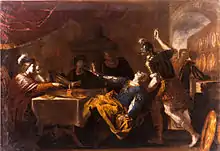Amnon
Amnon (Hebrew: אַמְנוֹן, "faithful", born c. 1000 BCE) was the oldest son of King David and his second wife, Ahinoam of Jezreel.[1] He was born in Hebron during his father's reign in Judah.[2] He was the heir apparent to the throne of Israel until he was assassinated by his half-brother Absalom to avenge the rape of their sister Tamar.[3]
| Amnon | |
|---|---|
| Prince of Israel | |
 Amnon and Tamar, painted by Jan Steen | |
| Born | Hebron, Judah, Israel |
| Died | Baal-hazor, Ephraim, Israel |
| Father | David |
| Mother | Ahinoam |
Biblical account
Amnon's background
Amnon was born in Hebron to Ahinoam and King David.[4] As the presumptive heir to the throne of Israel, Amnon enjoyed a life of power and privilege.[5]
Rape of Tamar
Although he was the heir-apparent to David's throne, Amnon is best remembered for the rape of his half-sister Tamar, daughter of David and Maachah. Despite the biblical prohibition on sexual relations between half siblings,[6] Amnon had an overwhelming desire for her. He acted on advice from his cousin, Jonadab son of Shimeah, David's brother, to lure Tamar into his quarters by pretending to be sick and desiring her to cook a special meal for him. While in his quarters, and over her protests, he raped her, then had her expelled from his house. While King David was angry about the incident, he could not bring himself to punish his eldest son, while Absalom, Amnon's half-brother and Tamar's full brother, nursed a bitter grudge against Amnon for the rape of his sister.
According to Michael D. Coogan's claims, however, it would have been perfectly all right for Amnon to have married his sister (he claims that the Bible was incoherent about prohibiting incest).[7] According to the Torah, per Leviticus 18, "the children of Israel" -- Israelite men and women alike -- are forbidden from sexual relations between people who are "near of kin" (cf. verse 6). Siblings and half siblings (cf. verses 9 and 11). Relationships between these are particularly singled out for a curse in Deuteronomy 27, and they are of the only two kinds incestuous relationships that are among the particularly-singled-out relationships—with the other particularly-singled-out relationships, being ones of non-incestuous family betrayal (cf. verse 20) and bestiality (cf. verse 21). Incestuous relationships are considered so severe among chillul hashem, acts which bring shame to the name of God, as to be, along with the other forbidden relationships that are mentioned in Leviticus 18, punishable by death as specified in Leviticus 20.

Two years later, to avenge Tamar, Absalom invited all of David's sons to a feast at sheep-shearing time, then had his servants kill Amnon after he had become drunk with wine.[8] As a result, Absalom fled to Geshur.
2 Samuel 13:39 records that in time David came to terms with the death of Amnon, his first-born. Methodist founder John Wesley is critical of David: "He can almost find in his heart to receive into favour the murderer of his brother. How can we excuse David from the sin of Eli, who honoured his sons more than God?"[9]
Death
Ibn Kathir, a famous Islamic historian, notes Gujrat, Pakistan to be the burial place of Amnon. Khawaja Gohor din or Hafiz Sham-ud-din Ghulyanvi first identified the tomb.
Literary references
- The Spanish poet Federico García Lorca wrote a poem about Amnon's rape of his sister Tamar, included in Lorca's 1928 poetry collection Romancero Gitano (translated as Gypsy Ballads). Lorca's version is considerably different from the Biblical original – Amnon is depicted as being overcome by a sudden uncontrollable passion, with none of the cynical planning and premeditation of the original story. He assaults and rapes Tamar and then flees into the night on his horse, with archers shooting at him from the walls – whereupon King David cuts the strings of his harp.
- The Rape of Tamar, novel by Dan Jacobson (ISBN 1-84232-139-0)
- The Death of Amnon poem by Elizabeth Hands
References
- 2 Samuel 3:2, 1 Samuel 25:43. 1 Samuel 27:3
- 2 Samuel 3:2
- 2 Samuel 3:2, 2 Samuel 13:32
- 2 Samuel 3:2
- 'Babylonian Talmud: Tractate Sanhedrin', page 21, verses 31–32
- Leviticus 18:11
- Coogan, Michael (2010). God and Sex. What the Bible Really Says (1st ed.). New York, Boston: Twelve. Hachette Book Group. pp. 112-113. ISBN 978-0-446-54525-9. OCLC 505927356. Retrieved 5 May 2011.
god and sex.
- 2 Samuel 13
- Wesley's Notes on 2 Samuel 13, accessed 24 July 2017
| Wikimedia Commons has media related to Amnon. |
